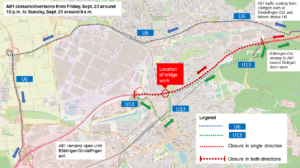
Host Nation Update, Sept. 21, 2022
Complete closure of A 81 between Böblingen and Sindelfingen
As part of the A 81 expansion to six lanes, the railroad bridge between Böblingen and Sindelfingen will also be renewed. This will require a further closure of the A 81 in both directions between the Sindelfingen-Ost and Böblingen/Sindelfingen junctions on Friday, September 23 from 10 p.m. until Sunday, September 25 until 9 am.
See full Citizen post: A81 closed through BB/Sindelfingen this weekend

Public transport – New cheap ticket to come
The federal and state governments want to provide clarity by mid-October on what a successor solution for the 9-euro ticket in local transportation might look like.
Chairwoman Schaefer said that the 16 states, without exception, had spoken out in favor of designing a follow-up offer together with the federal government. A working group would now be set up for this purpose, “which should come to a result relatively quickly.” If possible, this should happen before October 12. That is when the transport ministers meet for their regular fall session. In addition to the price of the planned ticket, the main issues to be clarified are how the federal and state governments will split the costs and what the new offer will do – for example, whether it will be valid nationwide or only in a limited number of transport associations. Ticket prices of 49 or 69 euros are the subject of public debate. However, there is no preliminary decision on this yet. At the same time, there is a dispute between the federal and state governments about the future financing of public transportation as a whole. He added that if a proposal is drawn up quickly now, the 9-euro ticket offer could come into force at the beginning of next year. The time between mid-October and the turn of the year would be sufficient to initiate and pass the necessary legislative changes. A conference of minister presidents with Chancellor Olaf Scholz (SPD) is planned for September 28. The package is to be discussed in detail there. (Stuttgarter Nachrichten, Sep 20)
Stuttgart – Prohibited zone for knives in the city moves closer
Presumably, a weapon ban zone will soon be established in Stuttgart’s city center. What the police had already hoped for to go in effect in the summer is now expected to go into effect this fall: strict ban to access of dangerous objects, which people may want to carry with them in their jacket pockets or pants. The state government’s Council of Ministers has given the go-ahead to prohibit weapons in designated zones.
State Interior Minister Thomas Strobl (CDU) stated on Tuesday after the meeting of the Council of Ministers that these designated zones should provide more security in public spaces. Strobl emphasized that “regulations will not be made in the blue” and that there will be exceptions. The regulations will initially apply for two years in order to evaluate experience.
Stuttgart’s mayor Frank Nopper welcomed the decision. He said the city had already drafted a corresponding ordinance. According to it, knives with a blade length of more than four centimeters are to be banned within the City ring for a limited period of time – on Fridays and Saturdays from 8 p.m. until the following day at 6 a.m. According to Mayor Clemens Maier, there are no plans to “specifically check for the carrying of knives.” However, a knife found during a “spot-check” could be confiscated. (Stuttgarter Nachrichten, Sep 20)
COVID-related news
Kretschmann issues “COVID all-clear”
Baden-Württemberg’s Minister President Winfried Kretschmann (Greens) has described the instruments provided by the federal government to combat the COVID pandemic as “poor.” He would have liked to be given more instructions in regards to the new Infection Protection Act in order to be able to act appropriately in any situation. Nevertheless, the prime minister gave his “all-clear” on COVID to a large extent at the state press statement on Tuesday: “We are now at the transition from pandemic to endemic. There is no fear of an overload of health facilities.”
This is the time to move from the “caution” team to the “liberalization” team, he said. At this stage, he said, people are responsible for their own health. It is necessary to see how the wave develops, the new omicron variant is very contagious, but it does not have such serious consequences that they cannot be treated “within normal health care”. Interfering with people’s freedom is no longer indicated, he said. “Incidentally, it has always been nonsense when I have been called a sharp dog in the pandemic,” Kretschmann said. (Stuttgarter Nachrichten, Sep 21)
Proof of vaccination no longer required
Social Affairs Minister Manfred Lucha (Greens) has announced that employees in hospitals, doctors’ surgeries and nursing homes in the state will not have to provide proof of a third vaccination if they were hired before October 1. This is intended to protect the facilities from a “massive bureaucratic effort”. It is true that the facility-based vaccination requirement still applies until the end of the year. And in principle, the federal law provides that from October 1, not only two vaccinations are enough as before, but “only triple vaccinated persons or at least double vaccinated persons with survived infection are considered fully immunized.”
Just like Bavaria, Baden-Württemberg will now waive any proof of evidence of vaccination status from staffs in homes and clinics. This is a “pragmatic approach before the expiry of the facility-based vaccination obligation,” said Lucha. The move has been unanimously welcomed by the Federal Association of Private Providers of Social Services, the Hospital Association and the County Council. He said it was good that Lucha was using the legal leeway: “In view of the massive nursing shortage in clinics and nursing homes, we cannot afford to demotivate employees by harassing them with a vaccination requirement that will expire at the end of the year anyway,” said Joachim Walter (CDU), president of the Landkreistag.
However, both clinics and nursing homes are also protesting against other obligations: “In the future, for example, an FFP-2 mask obligation will apply to every person entering a hospital without exception, he said. “Under no circumstances can this continued to be enforced. From our point of view, mandatory masks are only necessary in high-risk areas of hospitals. The tightening of testing requirements is a particular nuisance. Employees in hospitals and homes would have to test themselves three times a week under supervision, even though they can test themselves, it’s a “declaration of mistrust” towards the employees, which leads to frustration. (Stuttgarter Nachrichten, Sep 21)
